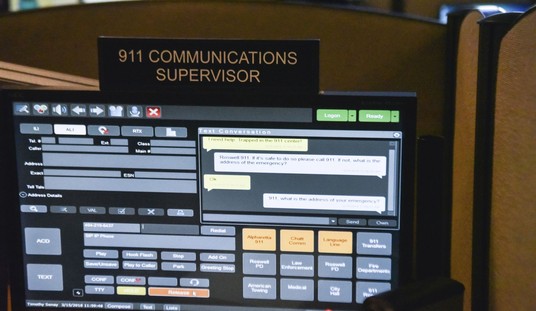There has been much controversy over the government’s efforts to advertise welfare programs, particularly the Supplemental Nutrition Assistance Program (SNAP), otherwise known as the “food stamp” program. Only they’re not “stamps” any more. The dependent masses of Food Stamp Nation get a little credit card, called an EBT Card, which they can use in the checkout lines, just like people who pay for their own food.
In theory, this electronic processing of food stamp benefits should have provided a data-processing defense against abuse. In practice, tales of outrageous abuse have only grown more common, as EBT cards are used to purchase everything from unhealthy groceries the Nanny State otherwise discourages – such as sugary carbonated beverages – to luxury foods, and even more creative uses like posting bail or tipping exotic dancers. The latter incidents are among the many bizarre abuses that arise from the ability of EBT card holders to withdraw cash from ATM machines, at which point all public accountability for the money is lost.
Amazingly enough, there isn’t any serious effort currently being made to process data from EBT card transactions, although Rep. Tom Marino (R-PA) has been trying to change that with a bill called the SNAP Transparency Act. The Washington Times describes the goal of this bill as the creation of “an online, searchable database that uses bar codes to break down how many taxpayer dollars in food stamps are spent on individual products, from Kit Kat bars to whole milk.”
Marino described it as “downright irresponsible” that an $80 billion program “is subject to virtually no oversight.” All of the government’s efforts are currently invested in recruiting new dependents to the SNAP program, not monitoring what existing beneficiaries are doing with the largess of the taxpayers. Those recruiting efforts know no boundaries… or borders, as watchdog group Judicial Watch just discovered.
It has long been known that the USDA was producing Spanish-language advertisements for the food stamp program. Judicial Watch filed a Freedom of Information Act request to determine how closely this effort was coordinated with the Mexican government:
The documents obtained by Judicial Watch show that USDA officials are working closely with their counterparts at the Mexican Embassy to widely broaden the SNAP program in the Mexican immigrant community, with no effort to restrict aid to, identify, or apprehend illegal immigrants who may be on the food stamp rolls. In an email to Borjon Lopez-Coterilla and Jose Vincente of the Mexican Embassy, dated January 26, 2012, Yibo Wood of the USDA Food and Nutrition Service (FNS) sympathized with the plight of illegal aliens applying for food stamps, saying, “FNS understands that mixed status households may be particularly vulnerable. Many of these households contain a non-citizen parent and a citizen child.”
The email from Wood to Lopez-Coterilla and Vincente came in response to a request from the Mexican Embassy that the USDA FNS step in to prevent the state of Kansas from changing its food stamp policy to restrict the amount of financial assistance provided to illegal aliens. In a January 22, 2012, article, the Kansas City Star had revealed that the state would no longer include illegal aliens in its calculations of the amount of assistance to be provided low-income Hispanic families in order to prevent discrimination against legal recipients.
Flyers provided to the Mexican embassy by the USDA include a statement – almost comically emphasized with both boldface and underlining – informing prospective SNAP beneficiaries, “You need not divulge information regarding your immigration status in seeking this benefit for your children.“
Judicial Watch president Tom Fitton tied this revelation into the comprehensive immigration reform debate: “These disclosures further confirm the fact that the Obama Administration cannot be trusted to protect our borders or enforce our immigration laws. And the coordination with a foreign government to attack the policies of an American state is contemptible.” The latter is a reference to the state of Kansas, which was seeking to change its food stamp policies to restrict financial assistance to illegal aliens. The Mexican embassy asked the USDA to intervene against this plan.
It’s true that potential beneficiaries must be made aware of government programs – there’s not much point in having programs that nobody knows about. But the degree of emphasis put behind these efforts can take them far beyond public information, and into the realm of active recruiting. There’s no other way to describe this level of coordination between the Agriculture Department and Mexico.
And the program doing all this aggressive recruiting is already generating a tsunami of abuse, while vigorously protecting itself from reform. Would it really be so difficult to use Information Age technology to swiftly hunt down food stamp abusers, while making certain EBT cards are used only for the purchase of affordable, healthy foods? Instead, the Washington Times notes the USDA “refuses to release information on how much business individual stores do in food stamps – going so far as threatening jail time for those who reveal it – even though it acknowledges that 8 percent of food stamp dollars taken to inner-city corner stores are illegally converted to cash, which such data could help illuminate.”
This has gone far beyond an effort to ensure the poor, and their children, receive proper nutrition. The food stamp program has, arguably, abandoned all efforts to verify the progress of that mission. It has become a mighty engine for the manufacture of dependency, and it’s looking to import new clients. Why should we trust the people who created such a system to faithfully adhere to the stern promises of accountability and security in a “comprehensive immigration reform” bill?
Much of the business of government boils down to data processing, which in the year 2013 should be completed with dispassionate efficiency – we have incredible technological resources for accumulating and mining information. When you see a data processing system as inefficient and corrupt as the food stamp program, you’re looking at deliberate sabotage.












Join the conversation as a VIP Member